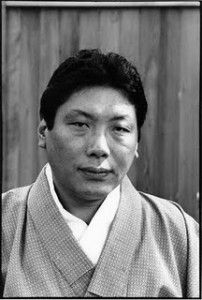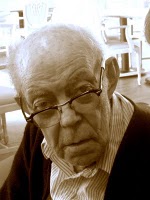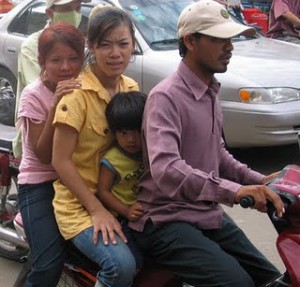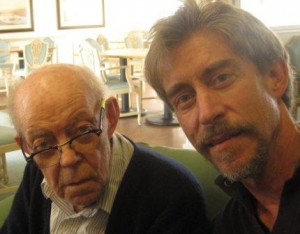Thursday
Arts and PoetryFather as Ancestor
 In this reposted article from 2011, Bill Scheffel reflects on both the passing of his father and the Shambhala teachings of Chogyam Trungpa (whom Bill refers to as “Lord Mukpo”, his family name and the name he often used when teaching Shambhala Training). This essay and collection of poems was inspired by the anniversary of his father’s death, extended periods of time Bill spent in Cambodia between 2004 and 2007, and his connection with Trungpa Rinpoche. It is part contemplation, part travel writing, and also an homage to lineage.
In this reposted article from 2011, Bill Scheffel reflects on both the passing of his father and the Shambhala teachings of Chogyam Trungpa (whom Bill refers to as “Lord Mukpo”, his family name and the name he often used when teaching Shambhala Training). This essay and collection of poems was inspired by the anniversary of his father’s death, extended periods of time Bill spent in Cambodia between 2004 and 2007, and his connection with Trungpa Rinpoche. It is part contemplation, part travel writing, and also an homage to lineage.
Originally published on The Drala Principle, all photos are courtesy of Bill Scheffel.
Our sangha brother Bill passed away in July of this year in Boulder, Colorado. We are so grateful to be able to appreciate this beautiful article.
Chogyam Trungpa, or Lord Mukpo, is my spiritual father or root teacher. My own father, William S. Scheffel, died exactly one year ago, on August 2nd. In the memory and living presence of both of my fathers, I offer the following prose poems, poems I wrote in three different countries and in three different years. The pieces are not about my fathers per se, but about their imprint, their echo, their request.
Faith
Unconditional faith is not something to believe in but something to know. It is not forcing myself to believe but encountering something believable, something undeniable, something innate. The encounter itself is intangible, a substance I cannot collect, bring home, or experiment on. I cannot prove its existence or even that it happened. Faith is packaged intangibility as terrain, an invisible homeland we emerged from, or once crossed over, or slept on for a night – that continues to exist as a spiritual echo or postcard.
Editor’s Note: We are currently on hiatus from publishing new articles; in the meantime, please enjoy this classic item reprinted from our back issues.
The text says, “That mind of sadness, possessing faith, free from thought is the profound tradition of the genuine great warriors.” Faith is an innate aspect of the mind of sadness – which is unconditional sadness: the all-embracing mercy, love and compassion that is an ocean without shore, distributed evenly and without beginning or end throughout the timeless and unbounded cosmos. It discovers us as gravity, intangible attraction. The mind of sadness possesses faith as the universe is possessed by gravity.
The mind free from thought is like the moon without space probes or discarded fuel tanks. A perfect sphere of non-interference that has no diameter. The thought that goes looking for something it can never find is freed by outer space and faith flares in countless unique constellations. The profound tradition of genuine great warriors are those who open to witness this immensity without location.
These warriors have journeyed though countless light years of aloneness. Since awake travels at the speed of light they became ever closer to themselves. On an endless journey, they have nothing to dispense but gravity itself; compassion or mercy in all its faces – terrible fires or the miracle of water. The most perfect geniuses of awakened warrior-ship travel faster than the speed of light, which explains how they might arise between the thought we just had and the one we haven’t had yet. The gap in thought is our invisible homeland and our faith the felt evidence of each of their visits.
31-May: 2009
Boulder, Colorado
In Paris
In Paris it was difficult to determine what the situation required of me. Was it grief, sharing, practice? It must have been all three because only those three were real. Sometimes the coffee was real, the blue of a cup as I photographed it. The Metro stops were real, the beauty of their names: Anvers, Pigalle, Blanche. The grief was real (points of exhaustion in the free-fall without station as one ages and those one loves are gone or far away, is that not demanding enough?) It would have been best to become still. And we did, in practice. Dominique, Sylvie, Lou, Alimone, Valerie. I discovered a voice of my own, made friends with it, shared it in stillness, finding accurate descriptions of mind’s cognizant nature functioning in the emergent, thickly inhabited easterly now. Each morning I pushed back the shutters of a window three stores above the sidewalks of Rue de Mont-Dore. Nothing mitigated a haunting sense of withoutness. Except the sharing. Dominique twice bought a cheese made in Switzerland one cuts with a special blade into the shape of crumpled flower petals, no thicker. Cote de Rhone and cheese and endive and walnuts and conversations, always about beauty and what we want to commit ourselves to: incessant spotlight imaging the future.
16-March: 2011
Istanbul
It is the street that works on me, tutors me, undoes me. It is as if I have never seen the streets before, any of them (though I have walked them for weeks). A violet wall. Charcoal in a bucket brings flames to the corn husk. Bananas dry in the sun lit upon by fly swarms. So many restaurants (mostly tables on the street-side) you never know where you should eat. Or what. There are as many smells as colors. Motorbike horns and frying oil airborne, drift by the boy who runs in a green shirt but without any shoes. Often I take the road that borders the causeway and try but cannot find the place in the scent of sewage that is awful. The logic of the street is survival, accommodation and change. People have found themselves economies. Some wash clothes. Some flatten bananas and grill them. Some sell gas out of liter bottles. Thousands of men drive motorbike taxis, wait on corners for passengers: slyly humorous, predatorily alert and quick to call out or guffaw. The sidewalk (to call it that) is intently inhabited, used, each person accommodated as they survive while changing economies worm along the street, behind fences, tearing down older houses and erecting new ones. This accounts for the variety of architecture but not its incoherence, a kind of rampant imagining of new wealth and how to express it. I am a wanderer, a foreigner, a walker, a post-meditator, a writer walking the street as it is walking me.
26-August: 2006
Phnom Penh
__________________________________________________________________
Bill Scheffel is a writer, poet and videographer. Bill attended the 1978 Vajradhatu Seminary and served as a kusung to Chögyam Trungpa Rinpoche. He was a director of Shambhala Training from 1980 until 2009, including co-directing Warrior Assembly at Shambhala Mountain Center, Dorje Denma Ling and Cuncumen, Chile. Bill taught classes in meditation, creative writing and poetry at Naropa University from 1991 until 2004. His current work is devoted to contributing to an understanding of the drala principle and other activities, as described in his website, The Western Mountain Project.








Dec 11, 2018
Reply
Bill will be dearly missed by all who knew him!
(I’m surprised this article doesn’t mention his passing this year — is the posting of these archived articles automated rather than curated?)
Dec 7, 2018
Reply
With respect to the Shambhala Times administrators: Bill Scheffel died a very tragic death earlier this year on July 8, 2018, in Boulder Colorado.
Thank you for republishing this moving article. The date of the original article isn’t clear.
Aug 8, 2011
Reply
Lovely Bill, please write more inspiring stories for us at the Times!